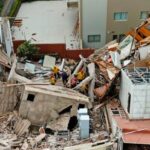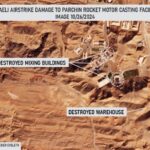
Dangote speaks on the construction of a refinery Nigeria banks on for economic revival, his frustrations, achievements, and expectations
• It’s like swimming in the middle of the sea, getting tired but making efforts to swim out lest you drown
Interestingly, I recently discovered a third marvel not too far from my place of employment in Lagos, Nigeria. This is the Dangote Petroleum Refinery located in Lagos’s Ibeju Lekki.
Alhaji Aliko Dangote, president of the Dangote Group, gave a thorough tour of the refinery last Sunday to a sizable group of businesspeople and members of the media. The engineering marvel has been written about and discussed extensively. Eze Anaba, President of the Guild of Editors, summed it up in one word: “monstrous.”
The wonderland, which is supposedly seven times larger than Victoria Island. It covers an area of approximately two thousand, six hundred and thirty-five hectares (2,635 hectares).
With 4.5 billion litres of storage capacity, it can meet the needs for crude oil for 20 days. With its 435 MW power plant, the refinery can supply all of the electricity needed by the states of Oyo, Ogun Osun, Kwara, and Ekiti. It’s enormous. It is enormous. That is horrible, in Eze’s words. And as Ojynika Orjyyyy Okpeeeee, introduced elegantly by Dr. Ruben Abati of Arise News, puts it, “It’s Dangote Planet.”
We used buses to get from one section to another. People once had the opportunity to travel in the same bus as Dangote and Group Executive Director of Strategy, Portfolio Development, and Capital Projects, Devakumar Edwin.
There were roughly seven additional buses. Dangote’s mastery of the refinery and his explanation of the intricacies and operations of various sections were astounding. Did he see every building project? We then drove to the main refinery from the hangars or quays where crude oil may be evacuated into pipelines that lead to the refinery and where refined oil can be discharged into ships.
various plants, petrochemical complexes, plants that produce hydrogen, nitrogen, and raw water treatment plants, among others. More than eighty storage facilities, some larger than football fields, were passed by our car. Some could hold sixty million petrol products. Ten thousand housing units for employees are located within the Dangote Industries Free Zone. There are up to 30,000 workers. We went to the fertiliser plant and its warehouse.
DANGOTE SAYS
Yes, there were frustrations but it’s like when you are swimming and you’re in the middle of the sea what do you do when you’re getting tired? You have no option but to continue and swim out.”
The first frustration was finding out that a great part of the land they bought had to be sand-filled as the place was marshy. They spent hundreds of billions doing that. The next was from the indigenes who challenged any action on the land because of their shrines in the place. More compensation would have to be paid to appease the gods. There were many more. Dangote had to build a port as moving crude from the Apapa port was going to be a herculean job. Was that part of the original plan? Many other things came up as construction went on. And for the lessons, experiences, and challenges he encountered, Dangote plans to write a book. “I plan to write a book on project implementation in Africa,” he said.
25 FACTS ABOUT DANGOTE REFINERY
The Dangote Petroleum Refinery Project is amongst our many initiatives towards supporting the transformation agenda of the federal Government. The Government is focused on turning Nigeria into a manufacturing hub, by adding value to our natural resources through processing and refining.
Our goal is to produce within Nigeria most of the goods that were usually imported despite having abundant resources for domestic manufacturing of the same goods. Our investment in cement manufacturing has made Nigeria self-sufficient, thereby transforming us from an import-dependent to cement exporting nation. We commissioned Dangote Fertilizer Plant in March 2022. With the nation now self-sufficient in the production of fertilizer, the surplus is going for the export market thereby generating crucial foreign exchange earnings for the country.
We conceived Dangote Petroleum Refinery & Petrochemicals as an answer to the perennial shortage of premium motor spirit (PMS) in the country. The completion of the project is another milestone for us at Dangote Industries Limited. It is the largest single-train refinery in the world with 650,000 barrels per day refining capacity. It marks the attainment of self-sufficiency in domestic refining of petroleum products and provides excess capacity in refined products, which will now go for the export market.
The refinery is designed to maximize gasoline production, which will account for 53 per cent of the production capacity, compared to most of the refineries in the world which produce between 20 to 25 per cent gasoline. The petroleum refinery can meet 100 per cent of the requirements of Nigeria, of all the liquid fuel products – Gasoline (PMS), Diesel (AGO), Kerosene ( DPK) and Aviation Jet Fuel (JET A-1)
Our new petroleum refinery is coming with many benefits. Refined petroleum is the main source of energy in the transport and powering of machines. The byproducts are also the basic materials of many diverse products as plastics, pharmaceuticals, solvents, fertilizers, pesticides, and clothing.
Our strategy of producing local goods that were hitherto imported creates jobs in the domestic economy instead of providing jobs in developed economies, the source of the imported goods. With the coming onstream of this refinery, thousands of direct and indirect jobs are already being generated from the activities and operations connected to the project. These jobs are helping to address the challenge of youth unemployment.
We envisage that 60 per cent of the production capacity of this petroleum refinery can meet the entire requirement of Nigeria while the remaining 40 per cent is earmarked for export. Exporting refined petroleum products will not only save the huge amounts of foreign exchange but will also trigger a massive inflow of the same into the domestic economy. The retained market foreign exchange can be invested in other projects that will stimulate more diversification of the Nigerian economy.
We surmounted numerous obstacles in our journey to build this refinery. To bring Dimensional Cargoes close to the site, we developed a port with four quays, which has a quay loading bearing capacity of 25 tonnes per square meters. This was done to bridge the distance between Apapa Port and our project site. The company also invested in 2,570 construction equipment including 2,238 civil construction equipment and 332 mechanical construction equipment.
The Petrochemical Plant is designed to produce 77 different high-performance grades of polypropylene. Petrochemical is the source of raw materials for many manufacturing and assembling plants. Products from the plant will serve as raw materials for the production of polyvinyl chloride (PVC), which is used extensively across a broad range of industrial, technical, and everyday applications including widespread use in building, transport, packaging, electrical/electronic and healthcare applications.
These new projects will no doubt, create linkages in the Nigerian economy leading to the evolution of ancillary industries that will use their byproducts as starting materials.























